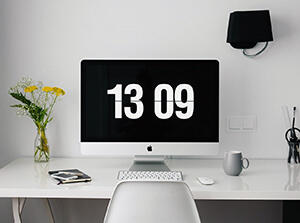How to Master Working from Home
See also: Working from Home: Top TipsIf there’s one thing that COVID-19 has made readily apparent, it’s the fact that we could all learn how to work remotely from time to time. With a huge part of the world in quarantine and everyone getting suggestions to stay at home, remote work has gone from the fringes of the workforce to being in the absolute spotlight.
Most employers who are able to conduct their business online are doing so. With all of this in mind, you’d do well to take the necessary precautions for remote work to be a success. If you haven’t worked from home before, this may not be easy for you at first.
Indeed, you’ll have to think about your work hours, your workstation, and the constant friction between your personal life and your job. And that’s without even getting into the details such as career advancement, the equipment you’re used to at the office, the work friends and colleagues you’re missing, as well as valuable training and learning opportunities.
While some people think working from home is easy, it also means taking all of the above-mentioned issues into consideration and dealing with them in the best way you know how. So, without further ado, here are some tips on how to master working from home!
Have a work schedule
Get used to a routine
Formalize human contact
Make a break schedule
Go outside if possible
Keep Regular Hours

Having strict work hours will help
your home productivity!
If you’re going to master working from home, you need to remember something - what’s changed about your job is only its location. Sure, even with time-tracking office apps, your managers and bosses will only be able to keep so much of a close eye on you. But that doesn’t mean you should start slacking or working irregularly - that’s bound to negatively impact your productivity.
In such an era of telecommunication, it’s vital that you stick to a defined work schedule even if your supervisors don’t demand it. Naturally, one of the benefits of working from the comfort of your home is the increased flexibility, but that’s something that should positively impact your work ethic, instead of hampering it. Considering that, you should define a strict work schedule - like from 9 to 5, or a bit later if you prefer - and then stick to it.
Steady Morning Routine
One of the most important personal skills for the workplace is self-organization, regardless of whether we’re talking about an office or a remote workplace at home. Sure, all of us can decide to start working at one point during the day, but sticking to that decision is not always easy, especially when you’ve got distractions like kids, pets, or general procrastination to derail you.
So, instead of just arbitrarily picking a point when you’ll begin your working day, you should work on giving yourself a steady morning routine, one that naturally guides you into starting work at the time you’ve decided. The specific elements of this routine are something you’ll have to decide for yourself, and something that will depend on your way of life. For instance, it could include brewing yourself a cup of java, or maybe going for a morning jog and a shower before work. In terms of getting you all worked up (no pun intended) for your job, a routine set in stone could be more useful than an alarm clock.

Your morning routine could be as simple as a cup of coffee!
Limit Contact with People
Once you start working remotely, you will realize that proper communication is one of the most important skills to have in a cloud-based telecommuting workspace. But that’s not just crucial for your work-related communication and thriving in high-stakes meetings. When you’re working from home, you will have to deal with other people in your household as well; people who may have schedules that conflict with yours.
Considering that, it’s quite useful to set some boundaries regarding non-work-related interactions during work hours. In other words, if your kids finish school (or schoolwork) before you’re done with your job, they need to know how they should act in order to not disturb you. Also, people shouldn’t expect you to do home chores during business hours unless it’s absolutely necessary and no one else can do it.
Taking Breaks
Sure, one of the perks of working from home is being able to take a much-needed break once in a while. But still, that should be a treat, not a three-course meal. To be clear, you need to set a strict break schedule that you’ll stick to. And if you’re a freelancer who’s working from home all the time, that goes double. After all, living well doesn’t just mean indulging in your every need all the time - it also requires moderation. So, an hour for lunch and a couple of shorter breaks should be more than enough.

Limit your downtime during business hours.
Leaving the House
As of now, leaving your home may not always be a possibility as a result of the COVID-19 pandemic. However, that won’t last forever, and you need to be prepared to work remotely even in regular situations. So, once you’re done with work, make sure to get some fresh air and clear your head - even a walk in your yard or garden will suffice!
Further Reading from Skills You Need
The Skills You Need Guide to Personal Development
Learn how to set yourself effective personal goals and find the motivation you need to achieve them. This is the essence of personal development, a set of skills designed to help you reach your full potential, at work, in study and in your personal life.
The second edition of or bestselling eBook is ideal for anyone who wants to improve their skills and learning potential, and it is full of easy-to-follow, practical information.
About the Author
John Rockwell is an IT freelancer and blog author, most often writing tips on successful self-employment and freelance careers. On his days off, he enjoys swimming or exploring other interests related to the IT industry, such as graphic design and digital marketing.


